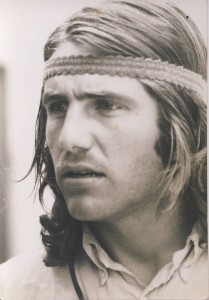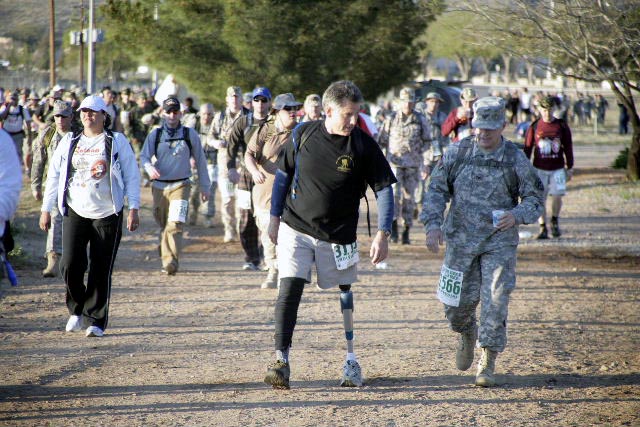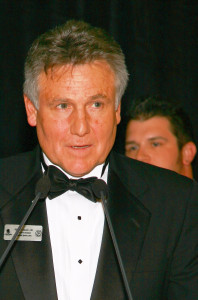July 17, 2015
After Amputation, “Sports Gave Me Freedom”

Kirk Bauer climbs Mt. Aconcagua in Mendoza, Argentina in 2015.
Kirk Bauer, 67, was an Army sergeant in the 9th infantry division for two years during the Vietnam War before he was medically discharged in 1969. He is now the executive director of Disabled Sports and lives in Catonsville, Md. He told his story to web producer Ruth Tam over the phone.
“I became disabled during the Vietnam War in March of 1969, so the most difficult thing for me was adjusting to life as an amputee –walking with an artificial leg and dealing with the discomfort, people staring at me.
The other thing was just the extreme contrast where you’re in a war zone and it’s ‘kill or be killed.’ People were dying and getting injured –a lot of serious life issues are dealt with. Coming back and not being able to relate to people, you feel different and separated because people are doing regular things and haven’t experience it and don’t understand. It’s hard to share. You’re not dealing with dying on the battlefield.
More of it has to do with time and process. I got very involved in sports and that’s one of the things that helped me. I had my first ski lesson on Dec. 1, 1969. I remember it very clearly. Sports really helped me adjust and gave me a sense of freedom when I got out on a bike or the ski slopes. It gave me a chance to do something very well.

Kirk Bauer in his sixth day of climbing Mt. Kilimanjaro, from Stella (19,000 ft.) to the summit, then back to Kibo.
In amputation, you live in a slow-motion world. On a mountain, I was able to go fast and be aggressive. It gave me a sense of accomplishment.
After I learned to ski as an amputee, I was so excited and wanted to teach others. I went through a two and a half year course to become a ski instructor. When I received certification, I felt so good about that. I was able to participate in the arena of teaching and it really boosted my confidence.
In 1972, I became involved in ski racing. Winning my first race and getting my national championships were the first real milestones where I felt like I was back and life was starting to shape up again.
When I went back to law school in 1975 in Boston, I ran a local program out of New Hampshire for veterans and non-veterans to learn. It was a chapter of Disabled Sports USA. It was my first experience in really working to build a community sports organization at a local level. Frankly, it kept my sanity when I went to school. Law school can make you nuts, so skiing helped.
After law school, I got a job as a legislative assistant in Washington, D.C. and stayed involved with Disabled Sports USA. Finally in 1982, I made a jump to become the first paid person at Disabled Sports USA. I’ve been the director since then.
The D.C. area is good for veterans because there’s a lot of support services, especially if you have a disability. The job market is strong here and generally tends to stay strong. There are also good education and recreational opportunities. For the quality of life, and avenues that support veterans, it’s a very good area. And, because you’re in the middle of a political scene, with debates about war, the area is aware of veterans. There’s generally a support of veterans from the community.
Any war is bad, but now, guys have to go back for multiple tours. It puts a tremendous strain on them and their families. I don’t think civilians understand the sacrifices vets make with their families when they serve in the military and go to war. I don’t think there’s enough appreciation for the skills they develop and bring with them to combat zones. Veterans are very innovative and good at doing their job no matter what. Those are qualities that are valuable to employees and I don’t think the civilian population appreciates the dedication, tenacity and flexibility that these young men and women develop.”
Wounded Veterans And Adaptive Sports – The Kojo Nnamdi Show
This interview has been edited and condensed for clarity. Photos are courtesy of Kirk Bauer. For more on military issues in the D.C. area, reserve your free tickets to a live taping of The Kojo Nnamdi Show with Sen. Tim Kaine (D-Va.) on Tuesday, July 21, 2015, at 7 p.m. at the Synetic Theater.
Every weekday, from 12-2 p.m. we do deep dives into diverse topics on our show. But here, on our blog, we want to do more to highlight the human experiences we talk about on air. On our blog, you can read short, personal essays that expand our on-air discussions. Submit your ideas here and happy reading!





